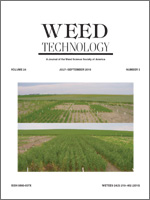Jerusalem artichoke has been reported to colonize several ecological niches and agronomic crops in southern Europe. This plant is also of interest because of its high biomass production and its potential to produce ethanol for biofuel. Allelopathy may be an advantageous trait in Jerusalem artichoke under cultivation, as it potentially reduces weed interference with the crop, theoretically allowing a reduction of mechanical or chemical input required for weed management. However, this trait may also be unfavorable if other crops are cultivated in rotation with Jerusalem artichoke or in areas infested by this species. The aim of this study was to investigate the sensitivity of selected diverse crops (wheat, lettuce, corn, tomato, rice, and zucchini) and weeds (barnyardgrass, black nightshade, common lambsquarters, common purslane, large crabgrass, and pigweed) to the presence of Jerusalem artichoke dried leaf tissues in laboratory experiments performed under controlled conditions. The simulated soil incorporation of different Jerusalem artichoke residues (four cultivars and a weedy population) was carried out in a series of laboratory and greenhouse experiments. Jerusalem artichoke reduced the radicle growth of seedling lettuce (60%), tomato (30%), large crabgrass (70%), and barnyardgrass (30%), whereas total germination of these species was less affected. Sensitivity to Jerusalem artichoke residues was species dependent; germination and initial growth of corn were not affected, whereas winter wheat, lettuce, tomato, rice, and zucchini seedlings were more sensitive to residue presence. Our experiments show that both wild and cultivated decomposing Jerusalem artichoke residues, particularly leaves and stems, possess phytotoxic potential. Additional field experimentation remains to be conducted to determine if allelopathy in the field contributes to its invasibility.
Nomenclature: Jerusalem artichoke, Helianthus tuberosus L.; barnyardgrass, Echinochloa crus-galli (L.) Beauv. ECHCG; black nightshade, Solanum nigrum L. SOLNI; common lambsquarters, Chenopodium album L. CHEAL; common purslane, Portulaca oleracea POROL; corn, Zea mays L.; large crabgrass, Digitaria sanguinalis (L.) Scop. DIGSA; lettuce, Lactuca sativa L.; pea, Pisum sativum L.; redroot pigweed, Amaranthus retroflexus L. AMARE; rice, Oryza sativa L.; tomato, Lycopersicon esculentum Mill.; wheat, Triticum aestivum L.; zucchini, Cucurbita pepo L.





